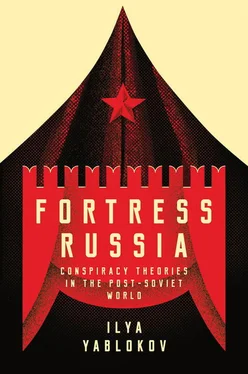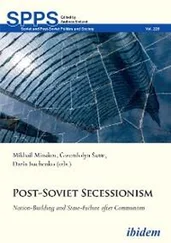In my analysis of texts, I also apply Critical Discourse Analysis (CDA), which provides a wide set of tools for the study of both language and the social developments reflected through it. CDA understands discourse as a form of social practice ‘which both constitutes the social world and is constituted by other social practices’ (Jørgensen and Phillips, 2002, p. 61). CDA can reveal how language is employed to exercise power and the extent to which linguistic elements can determine social reality. This approach implies that discourse possesses an ideological effect which contributes to the creation and reproduction of unequal power relations between different social groups, and shows how language contributes to the maintenance of power (Jørgensen and Phillips, 2002, p. 63).
Given that this book is primarily concerned with the use of conspiracy theories by political and intellectual elites in Russia, three groups of people in these categories are identified and analysed in terms of their salience, their impact on domestic politics and the degree to which conspiracy theories are used.
The first group consists of public intellectuals, journalists and various media personalities. In many respects, these people shape the intellectual framework of public conspiracy discourse and develop its conceptual apparatus, making it relevant to the current political agenda. They support the political actions of the authorities, justify political decisions and explain political events through journal articles, interviews and public appearances. The second group consists of politicians who are members of political parties and political movements. [2] The analysis does not include the groups of the so-called ‘non-systemic’ opposition such as right-wing extreme nationalists because it would have required a significant widening of the research focus.
It is, though, difficult to accurately determine who is a member of this group because the Russian political arena includes so many political movements and parties, and only a minority are represented in the legislative branch of government. Being a member of parliament would not be an accurate indicator of inclusion in this group because even the so-called ‘non-systemic opposition’ has sufficiently powerful resources to enable it to disseminate conspiracy theories. All the same, the impact which members of parliament and political movements have on domestic politics cannot be compared with the political power of the executive branch of the government, which constitutes the third group. This includes the President and the Prime Minister of the Russian Federation and members of their staff. This group also includes leaders of the United Russia party whose influence and decisions are pivotal in determining the domestic political agenda.
Chapter 1outlines the history of conspiracy theories in Russia from the end of the eighteenth century, and shows how the tradition of searching for enemies developed among political and intellectual elites of Imperial and Soviet Russia.
Chapter 2studies the role of public intellectuals in producing and disseminating conspiracy theories in post-Soviet Russia. It investigates the collaboration of Russian intellectuals with the authorities, and how prominent public intellectuals and media personalities introduce conspiracy theories into mainstream political discourse.
Chapter 3analyses conspiratorial narratives relating to the collapse of the USSR in 1991, and their function in domestic politics. It demonstrates how the application of conspiracy discourse to two major events – the August 1991 coup and the subsequent collapse of the Soviet state in December 1991 – became a powerful political instrument.
Chapter 4examines the impact of conspiracy theories on the nation-building policies of the Kremlin in the 2000s. It studies the Kremlin’s attempts in the 2000s to create a Russian national identity based on the concept of sovereign democracy, a term coined by the Kremlin’s ‘grey cardinal’ Vladislav Surkov when he was Deputy Head of the Presidential Administration.
Chapter 5focuses more specifically on the utilization of anti-Western conspiracy theories in domestic politics. Its primary focus is the Yukos affair and the three campaigns against non-governmental organizations (NGOs) which were based on the notion of a subversive ‘fifth column’ within the state. The chapter also examines the dynamics of the anti-Western conspiracy narratives and the evolution of political strategies which have been used against the Kremlin’s political opponents.
Chapter 6investigates the domestic application of anti-Western conspiracy theories and the role of conspiratorial narratives in the electoral campaigns of 2007–8 and 2011–12. Following Fenster’s definition of conspiracy theories as a tool for redistribution of power between political actors, this chapter looks at the place of conspiracy theories in electoral campaigns.
Chapter 7looks at the use of anti-Western conspiracy theories during the Ukraine crisis of 2014–16. It demonstrates how the corpus of conspiracy theories, which were developed throughout the post-Soviet era, has been taken up by television, and used for unprecedented public mobilization against the West.
1
Building ‘Fortress Russia’
Conspiracy theories have a long history in Russia. According to Andrei Zorin (2001), the concept of conspiracy originated in European intellectual thought and arrived in Russia in the eighteenth century. Zorin analysed a poem by a court poet, Vasilii Petrov, that described an alliance of European countries against Russia, which they perceived to be a growing power with global ambitions. Petrov saw the intrigues of European monarchs against Russia as a malevolent plan to destroy the country’s greatness. Although this cannot be called a genuine conspiracy theory since it lacks the crucial elements, it points to the origins of the phenomenon and the social level at which these concepts initially emerged. As with Western European countries, ideas about conspiracy in Russia initially emanated from intellectual and political elites who were well educated and who suffered the most from changes in the social and political environment (von Bieberstein, 2008).
Fears about masonic plots – one of the most popular and enduring of conspiracy theories, which first emerged in the mid eighteenth century – were also promulgated, for the most part, by people in the upper echelons of Russian society. As Smith (1999) demonstrates, suspicion of Freemasonry in Russia was based on rumours that its members had close ties to the devil, were atheists and indulged in sexual rituals. In this respect, Russia was no different to Europe. These fears about the Masonry appeared simultaneously in other European countries, with Freemasons accused, for example, of triggering the French revolution. A similar fear in Russia that Freemasons were plotting revolution led the Russian state to clamp down on them at the end of the eighteenth century, closing Freemason societies across the country and imprisoning the leader, Nikolai Novikov. All the same, fear of what was thought to be the omnipotent Masonry continued throughout the nineteenth and twentieth centuries as an important element in anti-Western conspiracy theories (Nilus, [1903] 2012; Platonov, 1996).
The anti-Western stance did not undergo any significant development until the mid nineteenth century. Even the famous debates between Slavophiles and the Westernizers, which began in the late eighteenth century, was less harsh at the beginning of the nineteenth century than it was at the end. Vera Tolz points out that the first round of debates between Westernizers and Slavophiles ‘reflected the divide between cosmopolitans of the Enlightenment and (proto) nationalists’ (2001, p. 65). In the late eighteenth and early nineteenth centuries the rapid development of the nation had not yet begun; this would not happen until the second half of the nineteenth century. Accordingly, a search for the dangerous ‘Other’, which would help to design the country’s identity and clarify who was ‘Us’ and ‘Them’, was at a premature stage.
Читать дальше
Конец ознакомительного отрывка
Купить книгу












